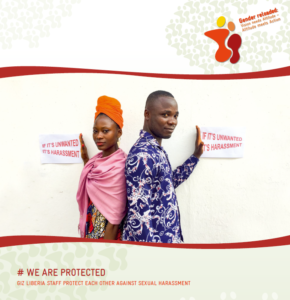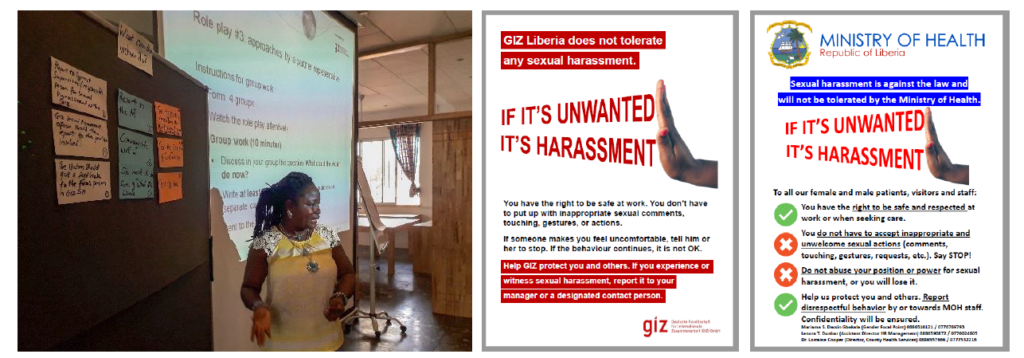GIZ LIBERIA STAFF PROTECT EACH OTHER AGAINST SEXUAL HARASSMENT
CONTEXT AND INITIATIVE
After a hard-hitting article on sexual abuse at a Liberian girls’ school was published in US media in October 2018, Liberian women’s rights activists started to mobilize under the #WeAreUnprotected banner to highlight a problem that was all too common but rarely talked about in Liberian society. By that time, GIZ Liberia staff had jointly developed and implemented a sexual harassment prevention and response system based on GIZ’s global policy but tailored to local needs to ensure everyone feels protected. An initial survey in May 2017 had revealed that more than 60% of GIZ Liberia staff did not feel sufficiently informed about GIZ’s policy and reporting mechanisms. We clearly had a case for action.
GENDER – A QUALITY FEATURE OF OUR WORK
The process of improving the system was led by the Gender Focal Persons with full support from the Country Director. All elements of the system were designed in such a way that the persons affected by sexual harassment are at the centre of decision making, enabling them to seek redress and support if they want to, while also allowing GIZ to react adequately as an institution. We designated local contact persons to be at the core of our system to make it accessible to all staff. They include both women and men and both national and international staff. These contact persons but also line managers need clarity on procedures, their responsibilities (and limits) and practical tips and tools such as case recording forms. For this we carried out a short, practical training that was underpinned by a detailed guidance note. Finally, we brought all 70+ GIZ Liberia staff together in awareness. Practical examples and role plays were used to convey the key points and the policy, brochures and posters were distributed to all staff and offices. GENDER IMPACT Two years after the first survey, 97% of GIZ Liberia staff surveyed in November 2019 confirmed that they feel now indeed protected against sexual harass both national and international staff. These contact persons but also line managers need clarity on procedures, their responsibilities (and limits) and practical tips and tools such as case recording forms. For this we carried out a short, practical training that was underpinned by a detailed guidance note. Finally, we brought all 70+ GIZ Liberia staff together in awareness. Practical examples and role plays were used to convey the key points and the policy, brochures and posters were distributed to all staff and offices.
GENDER IMPACT
Two years after the first survey, 97% of GIZ Liberia staff surveyed in November 2019 confirmed that they feel now indeed protected against sexual harassment at the workplace. 68% felt well informed about GIZ’s anti-sexual harassment policy (compared to 40% in 2017) and 65% felt well informed how to report cases (compared to 38% in 2017). The sexual harassment prevention and response system was also adopted by GIZ in neighbouring Sierra Leone with 140+ staff. A tool box and lessons learnt from the process were presented at GIZ Gender Network Meetings in Bonn and Accra and shared with the IDA Community on Sexual Harassment. On request of Liberia’s Ministry of Health, one of GIZ projects provided advice on adapting the approach to the ministry’s needs. The system now formally covers more than 11,000 workers employed by the Ministry in all parts of the country. What started as an effort to protect our own 70+ staff has become part of a nation-wide effort. Challenges in institutionalisation remain and attitudes and behaviour do not change overnight, but step by step we want to ensure that more and more Liberians can say: #WeAreProtected.
Raising awareness on sexual harassment: GIZ staff event; GIZ poster; Ministry of Health poster © GIZ Liberia
Contact:
Viktor Siebert and Bernice Gardy
GIZ Liberia
E viktor.siebert@giz.de
bernice.gardy@giz.de
Full information Roll Up: GENDER COMPETITION 2020 Contributions SERIES I 14
Competition Entry: 30 EN GIZ 2020 Gender Competition Liberia Sexual Harassment

 GIZ Gender Website
GIZ Gender Website
